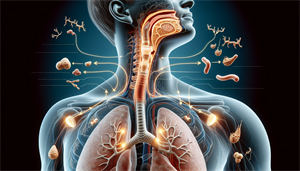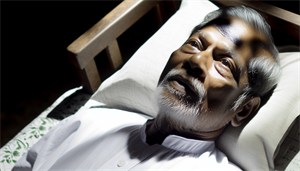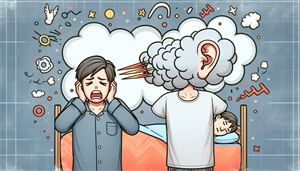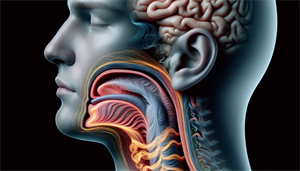Obstructive Sleep Apnea (OSA) is a common sleep disorder that affects millions of people worldwide. It disrupts the normal sleep cycle, leading to daytime sleepiness, concentration difficulties, and a host of other health issues. One lesser-known consequence of OSA is its impact on testosterone levels, a crucial hormone for both men’s and women’s health. The relationship between sleep apnea and low testosterone presents a complex, multifaceted issue with implications for sleep quality, overall health, and quality of life.
Unraveling the intricate relationship between OSA and sleep apnea and low testosterone necessitates a deep understanding of both conditions. This blog post explores this complex interplay, shedding light on the effects of sleep apnea on testosterone production, the impact of low testosterone on sleep quality, and the role body weight plays in this equation. We also delve into treatment considerations and strategies to naturally boost testosterone levels in OSA sufferers, providing a comprehensive guide for navigating the complexities of sleep apnea and low testosterone and hormonal health.
Key Takeaways
-
Obstructive Sleep Apnea (OSA) has been shown to negatively impact testosterone levels due to sleep fragmentation and reduced REM sleep, with factors such as obesity and age complicating this relationship.
-
Testosterone production is closely tied to the sleep-wake cycle and can be disrupted by OSA, which emphasizes the importance of addressing sleep disorders and maintaining a healthy weight for hormonal balance.
-
Treatment approaches like Continuous Positive Airway Pressure (CPAP) therapy and lifestyle changes are pivotal for managing OSA, yet their effects on testosterone levels vary, necessitating individualized and comprehensive patient treatment plans.
The Interplay Between Obstructive Sleep Apnea and Testosterone Deficiency

Obstructive Sleep Apnea (OSA) and testosterone deficiency are intricately linked conditions. Sleep fragmentation and less REM sleep, both common symptoms of obstructive sleep apnea syndrome, have been shown to decrease testosterone levels. This relationship between OSA and testosterone deficiency is further complicated by factors like obesity and age, which also contribute to decreased testosterone production.
Testosterone Replacement Therapy (TRT) is commonly prescribed for men with low testosterone. However, its use in patients with OSA is a contentious issue. Studies have shown that TRT can actually worsen symptoms of OSA, leading to increases in the apnea-hypopnea index (AHI), a measure of sleep apnea severity, and decreases in oxygen saturation levels during sleep. Thus, TRT in the context of OSA presents a therapeutic dilemma, highlighting the need for a more nuanced understanding and approach to treatment.
The complex interplay between OSA and testosterone deficiency underscores the importance of comprehensive patient treatment. It’s not just about addressing the sleep apnea or restoring testosterone levels, but also considering the broader health context, including factors such as obesity and age. This multifaceted approach is crucial for improving the overall health and quality of life for patients with OSA.
Insights into Testosterone Production During Sleep
Testosterone production follows a certain rhythm, tightly linked to our sleep-wake cycle. At the onset of sleep, testosterone levels begin to increase, reaching their peak around the first REM sleep stage, and then remaining relatively stable throughout the duration of the sleep period. This nocturnal testosterone rhythm is a crucial aspect of hormonal health, ensuring normal physiological functions.
However, sleep disorders like OSA can disrupt this natural rhythm. Severe OSA, characterized by frequent awakenings and less REM sleep, can lead to potential hormonal imbalances, including testosterone deficiency. This disruption emphasizes the need for maintaining good sleep hygiene and addressing sleep disorders, such as sleep disordered breathing, promptly.
Interestingly, sleep loss at the beginning of the night does not seem to decrease testosterone levels. However, factors such as body mass index (BMI) can play a role in the development of sleep disorders like OSA, which can, in turn, impact testosterone levels. This indicates that maintaining a healthy body weight could be a vital strategy in safeguarding both sleep and hormonal health.
Investigating the Effects of Low Testosterone on Sleep Quality
Low testosterone levels can have significant implications for sleep quality. OSA patients with low testosterone levels often experience:
-
Increased time spent awake after going to bed
-
More nighttime awakenings
-
Lower oxygen levels during sleep
-
Reduced time spent in deep sleep
This presents a double-edged sword for these patients: not only does OSA disrupt their sleep, but the resulting low testosterone levels can further exacerbate their sleep problems.
To fully understand the effects of low testosterone on sleep quality, we need to delve deeper into two crucial aspects: the impact on sleep architecture and the influence on daytime functioning. These aspects are further explored in the following subsections.
Impact on Sleep Architecture
Sleep architecture refers to the fundamental structure of typical sleep, encompassing the various stages and cycles of sleep. Testosterone levels play a critical role in maintaining optimal sleep architecture. Diminished testosterone levels can result in lower sleep efficiency, increased frequency of nighttime awakenings, and decreased deep sleep time, all crucial elements of sleep architecture.
Deep sleep, also known as REM sleep, is a critical stage of sleep. It is during this phase that our bodies repair muscles, synthesize proteins, and carry out other restorative processes. Low testosterone levels have the potential to disturb REM sleep, thereby compromising these important functions and ultimately affecting overall health and well-being.
Interestingly, a study in mice suggests that Testosterone Replacement Therapy (TRT) can potentially address changes in sleep architecture caused by testosterone loss. However, as mentioned earlier, the use of TRT in OSA patients is a contentious issue due to its potential to exacerbate sleep apnea symptoms.
Influence on Daytime Functioning
The effects of low testosterone levels extend beyond sleep and into daytime functioning. Research shows that testosterone levels are independently linked to physical fatigue and decreased activity in OSA patients. This implies that low testosterone levels could potentially contribute to daytime sleepiness, reduced energy levels, and decreased productivity in these individuals.
Furthermore, severe OSA patients with low testosterone levels exhibit:
-
Elevated levels of general fatigue
-
Physical fatigue
-
Mental fatigue
-
Decreased physical activity
This highlights the considerable impact of serum testosterone levels on the overall quality of life for OSA patients, emphasizing the importance of monitoring and maintaining healthy serum testosterone levels.
Interestingly, diminished levels of testosterone have also been associated with heightened daytime sleepiness in males diagnosed with OSA. This suggests that testosterone levels may not only impact:
-
physical activity
-
fatigue levels
-
sleep-wake cycles
-
daytime alertness
The Role of Body Weight in Sleep Apnea and Hormonal Balance

Body weight plays a significant role in the development of sleep apnea and hormonal imbalances. Obesity, in particular, is linked to the development of OSA due to increased pressure on the upper airways and reduced neuromuscular function. Moreover, there is a direct correlation between weight loss and elevated plasma testosterone levels in obese men, implying that weight management could potentially improve both OSA and testosterone deficiency.
This relationship between body weight and testosterone levels is bidirectional. While low testosterone can result in weight gain, particularly an increase in abdominal fat, weight loss in obese men has been demonstrated to elevate plasma testosterone levels. This suggests that weight management could be a crucial strategy in addressing both sleep apnea and testosterone deficiency.
Sleep apnea, in turn, contributes to weight gain, which can potentially affect hormonal balance by disrupting testosterone levels. Thus, managing OSA is not only important for improving sleep quality but also for maintaining hormonal health and optimal body weight.
Treatment Considerations: CPAP Therapy and Hormone Levels
Continuous Positive Airway Pressure (CPAP) therapy is a common treatment for OSA. It keeps the airways open during sleep, thereby preventing the characteristic breathing pauses of OSA. However, its effects on testosterone levels remain inconclusive. While some studies indicate that CPAP therapy doesn’t significantly alter serum total testosterone levels, the variations in baseline testosterone levels between hypogonadal and eugonadal patients suggest that the impact of CPAP therapy might vary among individuals.
Given the limited impact of CPAP therapy on testosterone levels, healthcare providers may need to explore alternative strategies for addressing hypogonadism in OSA patients. These might include lifestyle modifications, such as weight management and regular exercise, or other forms of hormonal therapy.
It’s important to remember that the goal of OSA treatment is not just to improve sleep quality, but also to address the various health complications that can arise from the condition, including testosterone deficiency. Therefore, a comprehensive, individualized approach to treatment is crucial.
Addressing Sexual Dysfunction in OSA Patients

Sexual dysfunction is a common concern among OSA patients. The disrupted sleep and reduced testosterone levels associated with OSA can lead to decreased libido, reduced sex drive, and lower sexual satisfaction. This can have a significant impact on an individual’s romantic relationships and overall quality of life.
Various treatments are available to address sexual dysfunction in OSA patients. These include surgical treatments, CPAP therapy, and the use of oral appliances like sildenafil. Interestingly, some studies suggest that sildenafil is more effective than CPAP in alleviating erectile dysfunction symptoms in OSA patients.
However, it’s important to note that the effectiveness of these treatments can vary among individuals. Therefore, healthcare providers need to consider the individual patient’s needs, health status, and treatment preferences when developing a treatment plan for sexual dysfunction in OSA patients.
Testosterone Replacement Therapy: Boon or Bane for Sleep Apnea?

Testosterone Replacement Therapy (TRT) can be beneficial for some OSA patients with low testosterone levels. By supplementing the body’s natural testosterone production, TRT can help alleviate symptoms of testosterone deficiency such as fatigue, depression, and reduced libido. However, TRT may worsen sleep apnea symptoms in some patients, particularly those with severe untreated OSA.
The potential for TRT to exacerbate sleep apnea symptoms presents a therapeutic dilemma. On one hand, TRT can help alleviate the symptoms of testosterone deficiency, improving the patient’s quality of life. On the other hand, it could potentially worsen the patient’s OSA, leading to poorer sleep quality and increased health risks.
Given these potential risks, it is recommended to proceed cautiously with the use of TRT in obese hypogonadal patients with hypoventilatory syndrome, particularly if the patients are not on CPAP therapy. This highlights the necessity for meticulous patient evaluation and tailored treatment strategies in managing OSA and testosterone deficiency.
Strategies to Naturally Boost Testosterone in OSA Sufferers

While treatments like CPAP therapy and TRT can be beneficial, there are also natural strategies to boost testosterone levels in OSA patients. These include improving sleep hygiene, engaging in regular exercise, and adopting a healthy diet. Each of these strategies is explored in further detail in the following subsections.
By adopting these natural strategies, OSA patients can potentially improve their sleep quality, boost their testosterone levels, and enhance their overall health and well-being. This comprehensive approach to managing OSA and testosterone deficiency highlights the role of lifestyle modifications in augmenting medical treatments.
Enhancing Overall Sleep Hygiene
Sleep hygiene refers to the practices and habits that promote good sleep health. Adhering to a regular sleep schedule, establishing calming bedtime routines, and optimizing the bedroom environment can contribute to improvements in testosterone production. This is particularly important for OSA patients, who often experience disrupted sleep and consequent hormonal imbalances.
Staying consistent with sleep and wake times helps regulate the body’s internal clock and can lead to better sleep quality. This consistent sleep schedule can support healthy testosterone production, emphasizing the role of sleep hygiene in managing both OSA and testosterone deficiency.
Interestingly, the use of electronic devices at night can disrupt sleep quality and potentially disturb testosterone levels. The blue light emitted by these devices can suppress the production of melatonin, a hormone that regulates sleep-wake cycles. This underscores the importance of limiting electronic device use before bedtime as part of good sleep hygiene practices.
Exercise and Diet
Regular exercise and a healthy diet are also crucial for managing OSA and boosting testosterone levels. Resistance training exercises like weightlifting and high-intensity interval training (HIIT) can increase testosterone levels. Moreover, consistent physical activity aids in weight reduction, which can alleviate OSA symptoms.
Dietary modifications can also support testosterone production. Here are some recommended dietary changes that can be a natural alternative to testosterone therapy:
-
Follow a weight-loss Mediterranean diet, which emphasizes whole foods
-
Include high-protein and high-carbohydrate foods in your diet
-
These dietary changes may have a positive impact on your overall health and well-being.
Certain foods that can increase testosterone production include:
-
Oysters
-
Leafy greens
-
Fatty fish
-
Olive oil
Foods rich in zinc, vitamin D, and magnesium are also beneficial for boosting testosterone levels. This implies that a well-balanced diet, together with regular exercise, can act as a powerful strategy for managing both OSA and testosterone deficiency.
Navigating the Complexities of OSA and Hormonal Health
The relationship between OSA and hormonal health is complex and multifaceted. OSA is associated with various endocrine and metabolic disorders, and it can trigger conditions like hypogonadism and glucose metabolism abnormalities. This suggests that managing OSA is crucial not only for improving sleep quality but also for maintaining overall hormonal health.
Sleep apnea can also disrupt testosterone levels, further complicating the management of OSA and hormonal imbalances. This highlights the importance of a comprehensive, multidisciplinary approach to treating OSA and testosterone deficiency. It’s not just about addressing the sleep disorder or restoring hormone levels, but also optimizing overall health and well-being.
Understanding the complex relationship between OSA and hormonal health is crucial for healthcare providers, patients, and their families. It allows for the development of more effective, personalized treatment plans that address both the sleep disorder and the hormonal imbalances. This comprehensive approach, combined with lifestyle modifications and patient education, can contribute to improved patient outcomes and a better quality of life.
Summary
In conclusion, OSA and testosterone deficiency are closely related conditions, each having the potential to exacerbate the other. Sleep apnea can disrupt the natural nocturnal rhythm of testosterone production, leading to low testosterone levels. Conversely, low testosterone levels can negatively impact sleep quality, leading to increased sleep fragmentation and reduced deep sleep.
Understanding this intricate relationship is crucial for managing both conditions effectively. Treatment options such as CPAP therapy and TRT can be beneficial, but they also come with potential risks and side effects. Therefore, a comprehensive, individualized approach that includes lifestyle modifications like improving sleep hygiene, regular exercise, and a healthy diet is crucial. With this approach, it is possible to navigate the complexities of OSA and hormonal health, improving not only sleep quality but also overall well-being.
Frequently Asked Questions
How does obstructive sleep apnea cause low testosterone?
Obstructive sleep apnea can cause low testosterone due to sleep disruption leading to increased stress hormone levels, as well as hypoxia and sleep fragmentation contributing to lower testosterone levels. Additionally, factors such as obesity and advanced age can also account for decreased testosterone secretion in men with OSA.
Does low testosterone affect sleep quality?
Yes, low testosterone levels can lead to insomnia by increasing cortisol, the body's primary stress hormone, which can result in shorter and shallower sleep cycles.
Can low testosterone affect breathing?
Yes, low testosterone can worsen symptoms of chronic obstructive pulmonary disease (COPD), leading to increased fatigue, loss of muscle mass, and early frailty.
Can sleep apnea mess with hormones?
Yes, sleep apnea can affect hormone levels, including testosterone, growth hormone, aldosterone, and vasopressin, as found in a study published by the European Respiratory Journal.
Can Testosterone Replacement Therapy (TRT) worsen OSA symptoms?
Yes, TRT can worsen OSA symptoms, especially in individuals with severe untreated OSA. It's important to consult with a healthcare provider before starting TRT.


